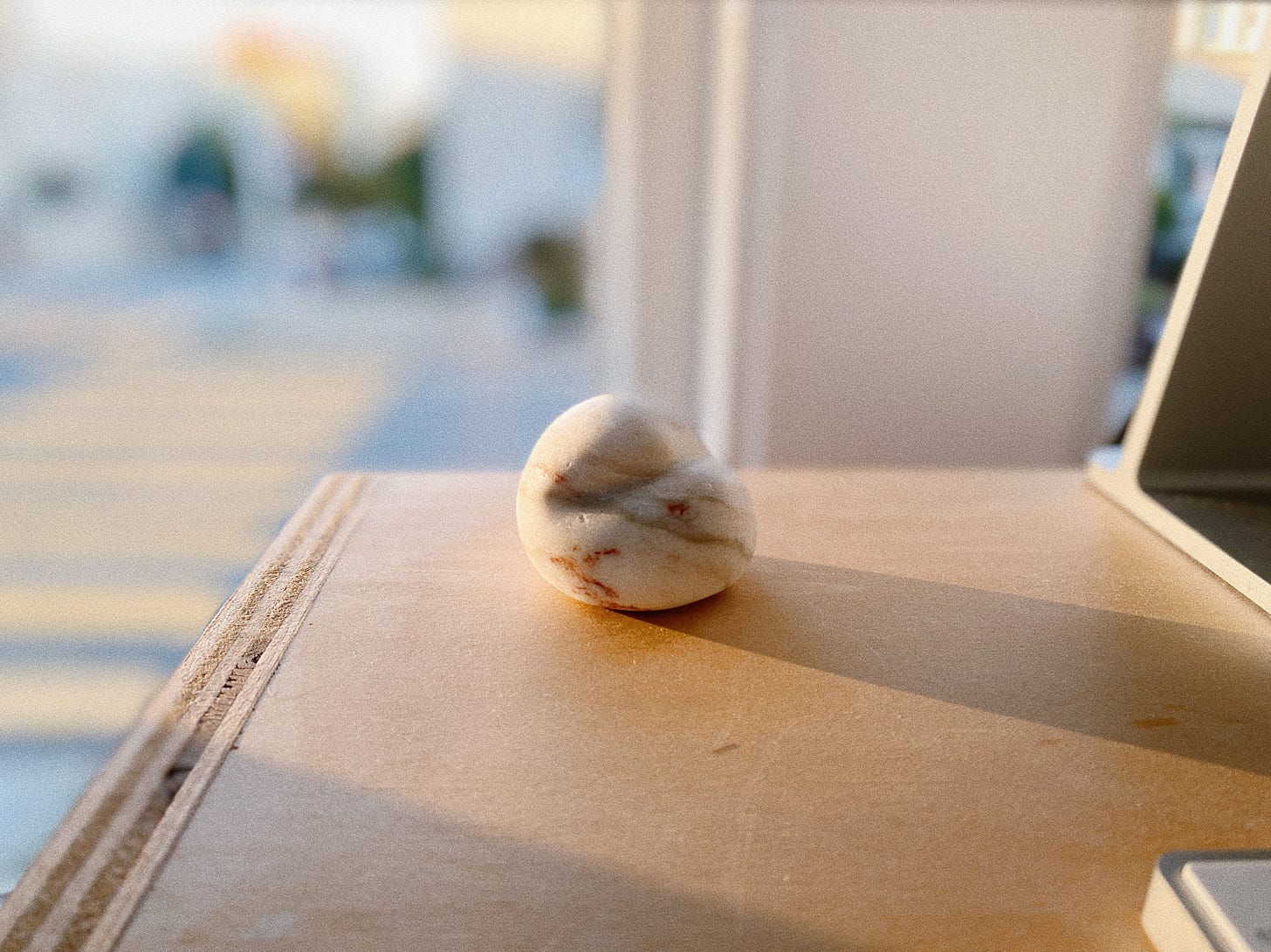Remember when I said I had three entries’ worth of stone carving reflections and I only ever wrote one? Oops. Over half a year later, perhaps now is as good a time as any to give my final two cents, which I hope have aged like fine wine instead of still being half-baked. It has come around again anyway as I open the new year—an important reminder as I resist the urge to set goals and expect outcomes.
When I was a kid, I loved the book If You Give a Mouse a Cookie. It starts with a little mouse who’s gifted a cookie and then successively asks for more—because once you have one thing, it’s only natural to want the next best thing, right? It goes on, the requests escalating into the absurd (I think he ends up cleaning the entire house??).
It’s scary how fast I can say Thank u, next and instantly strive for more. After all, isn’t ambition the antidote to complacency? With technology and machinery within our reach, maybe we feel like we have no excuse. Plus, our culture feeds on this. On a personal front, I at least know I’m not standing still.
But while this rabid cookie-driven need to level up seems like a boundless tap of motivation, I find myself exhausted by it year after year. I think about how I used to devour books as a kid, which led me to dabble in an English major in college. This resulted in my being so burnt out from obligatory reading that I barely picked up books willingly as an adult.
There’s something that qualitatively happens to my love of things when I overcomplicate it with goals and expectations, when I set it on a highway instead of in an open field. It’s a notion I’ve quietly known but never knew how to integrate with the productivity-obsessed world. It was in the confines of carving stone that mirrored this process back to me, as I realized my frustration with the medium was really my need to accomplish some lofty goal with everything I do.
Staying with the Simplicity, in More Ways Than One
Where I learned stone carving was this massive hangar space that offers classes in all sorts of industrial arts: welding, glass blowing, bladesmithing, you name it. I expected to spend a week or two on hand tools before moving onto machinery. But as the weeks went on, that option never came.
If I could sum up my instructor’s style, it was laissez-faire to the max. From Day 1, he gave us chisels and left us to our own devices. I didn’t mind it at first; it was nice to not have any expectations while we experienced firsthand how our movements affected the material. But as the thing before me started to take shape, I felt the impossible draw of wanting to turn the stone into ~a sculpture~.
When he’d make his rounds to each person, I’d express the same frustrations that I sometimes have with wood: are machines an inevitability if I want to continue carving hard materials? There’s always this nagging thought that I should be moving faster, learning to use more complex tools, but his words cut straight to something I’d never heard: “Try staying with the simplicity.”
He elaborated later on this: “If you try to move faster, you end up needing mechanized processes, assistants, and technical planning. When you aren’t trying to make something specific, you have total freedom. You can’t do anything wrong.” He felt that power tools were effective as “tools of execution,”—things that get a job done and get it done fast—and that’s fine, if those are your goals.
I’ve long thought of my dedication to simplicity as stubbornness. But in a world where everything can be done fasterfasterfaster, simplicity seems like an intriguing route to take. Instead of signaling a comfort zone, maybe it can be a creative and fulfilling challenge for those who treasure the making of art as much as the outcome itself.
As I said in an earlier post, I never once felt like my teacher knew how profound his words were and how they validated the slowest and most intentional parts of carving—the parts I enjoy the most. When he walked away to chat with the next student, I furiously typed his -isms into my Notes app with dusty hands.
Cheers to a simpler year
Many months later, as I started 2024, I found myself feeling exhausted by the idea of resolutions or creative goals, instead coming back to his words: staying with the simplicity. I asked myself why I was always striving—where am I trying to go? Does it matter if I get there, or will the goalpost just move ever farther? Why is all of my energy going towards an endless chase?
My friend C shared this poignant poem by Marge Piercy with me last year. It essentially asks: If you want to be a writer, do you have to compose prize-winning literature to justify your existence? Is a successful artist one who makes their mark in the collective attention and sells out their wares in 5 minutes, or can it be the person who quietly works on what they enjoy without much fanfare? And, of course, “success” by whose standards? The final line hits deep: “You have to / like it better than being loved.”
I remember a high school English teacher once explained to our class, who loooved to throw fancier-sounding words into essays, that “simplistic” and “simple” were not the same. I wonder if we start to conflate their meanings again when we feel the pressure to show the world we’re worth something.
There comes a point when my arbitrary goals prevent me from doing, or even wanting to do, the things I truly love. And when that happens, I know I have to simplify. I have a feeling that 2024 will be that kind of year for me.




